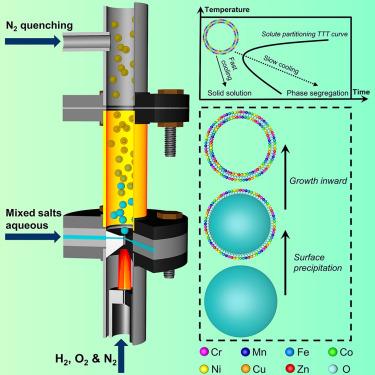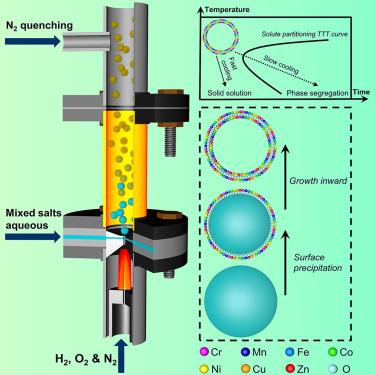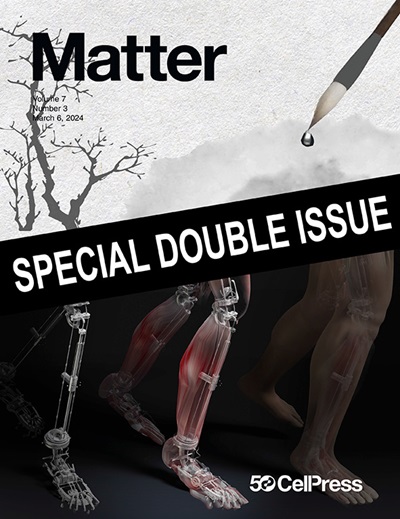A general flame aerosol route to high-entropy nanoceramics
IF 17.3
1区 材料科学
Q1 MATERIALS SCIENCE, MULTIDISCIPLINARY
引用次数: 0
Abstract
High-entropy ceramics are an emerging class of materials with fascinating characteristics. However, elemental immiscibility and crystal complexity limit the development of a general synthesis strategy, and common methods yield bulk materials. Here, we introduce a transformative non-equilibrium flame aerosol technique for synthesizing high-entropy nanoceramics. This scalable, one-step process enables the production of high-entropy oxide nanoceramics with an unprecedented diversity of crystal structures, including fluorite-phase materials that integrate up to 22 distinct cation elements. The method’s capacity for entropic stabilization and grain refinement significantly improves the thermal stability of these nanostructures. In a representative application, a Pt-(MgCoNiCuZn)O high-entropy single-atom catalyst showed superior activity and long-term stability, maintaining constant CO2 conversion over 670 h and dramatically outperforming conventional catalysts. The general approach opens a vast composition and structure space for the creation of high-entropy oxide nanomaterials for application across diverse fields, including catalysis, energy storage, sensing, and thermal management.


高熵纳米陶瓷的一般火焰气溶胶路线
高熵陶瓷是一类新兴材料,具有迷人的特性。然而,元素的不溶性和晶体的复杂性限制了通用合成策略的发展,而常见的方法则会产生块状材料。在此,我们介绍一种用于合成高熵纳米陶瓷的变革性非平衡火焰气溶胶技术。这种可扩展的一步法工艺能够生产出具有前所未有的多种晶体结构的高熵氧化物纳米陶瓷,包括集成了多达 22 种不同阳离子元素的萤石相材料。该方法的熵稳定和晶粒细化能力显著提高了这些纳米结构的热稳定性。在一个具有代表性的应用中,一种铂-(镁钴镍铜锌)O 高熵单原子催化剂显示出卓越的活性和长期稳定性,在 670 小时内保持恒定的二氧化碳转化率,大大优于传统催化剂。这种通用方法为创造高熵氧化物纳米材料开辟了广阔的组成和结构空间,可应用于催化、储能、传感和热管理等多个领域。
本文章由计算机程序翻译,如有差异,请以英文原文为准。
求助全文
约1分钟内获得全文
求助全文
来源期刊

Matter
MATERIALS SCIENCE, MULTIDISCIPLINARY-
CiteScore
26.30
自引率
2.60%
发文量
367
期刊介绍:
Matter, a monthly journal affiliated with Cell, spans the broad field of materials science from nano to macro levels,covering fundamentals to applications. Embracing groundbreaking technologies,it includes full-length research articles,reviews, perspectives,previews, opinions, personnel stories, and general editorial content.
Matter aims to be the primary resource for researchers in academia and industry, inspiring the next generation of materials scientists.
 求助内容:
求助内容: 应助结果提醒方式:
应助结果提醒方式:


